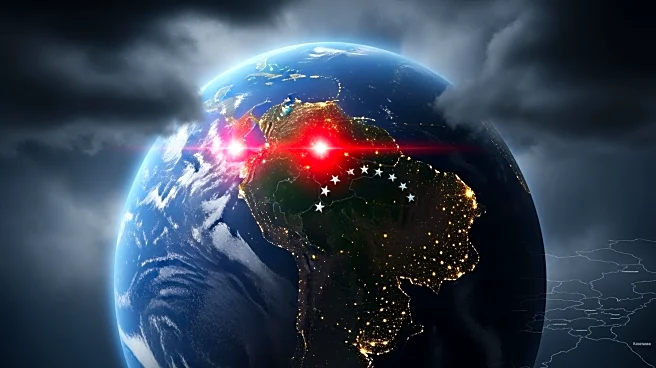What's Happening?
President Trump has initiated a series of military strikes against suspected drug traffickers in the Caribbean, particularly near Venezuela. These operations, which began in September 2025, have resulted
in the destruction of several vessels and the deaths of at least 27 individuals, whom Trump has labeled as 'narco-terrorists.' The strikes have been conducted without congressional authorization or judicial oversight, raising significant legal and ethical questions. Human rights monitors have reported that some of the destroyed vessels may have been carrying migrants or fishermen rather than armed traffickers. Survivors have been detained by U.S. personnel, but their legal status remains unclear.
Why It's Important?
The military actions taken by President Trump have sparked debate over the legality and morality of using military force against suspected drug traffickers. By designating Latin American cartels as Foreign Terrorist Organizations, the administration has justified treating them as hostile combatants, a move criticized by legal experts as a misuse of power. This approach bypasses traditional law enforcement methods and could set a precedent for future administrations to use military force in similar contexts, potentially eroding democratic principles and leading to extrajudicial executions. The operations have also strained international relations, with Venezuela condemning the strikes as illegal acts of aggression.
What's Next?
The ongoing military campaign may face increased scrutiny from human rights organizations and legal experts, who are demanding transparency and accountability from the U.S. government. The American Civil Liberties Union and Human Rights Watch have called for the release of legal documents authorizing the strikes. Additionally, the situation may lead to diplomatic tensions, as Venezuela has appealed to the U.N. Security Council for censure. The broader implications of these actions could influence U.S. foreign policy and military engagement strategies, particularly in regions affected by drug trafficking.
Beyond the Headlines
The designation of drug cartels as terrorists and the subsequent military actions highlight a shift in U.S. policy that blurs the lines between law enforcement and military operations. This approach raises ethical concerns about the use of lethal force without due process and the potential for abuse of executive power. The precedent set by these actions could lead to a slippery slope where individuals or groups are targeted based on executive orders, undermining the rule of law and democratic accountability.










